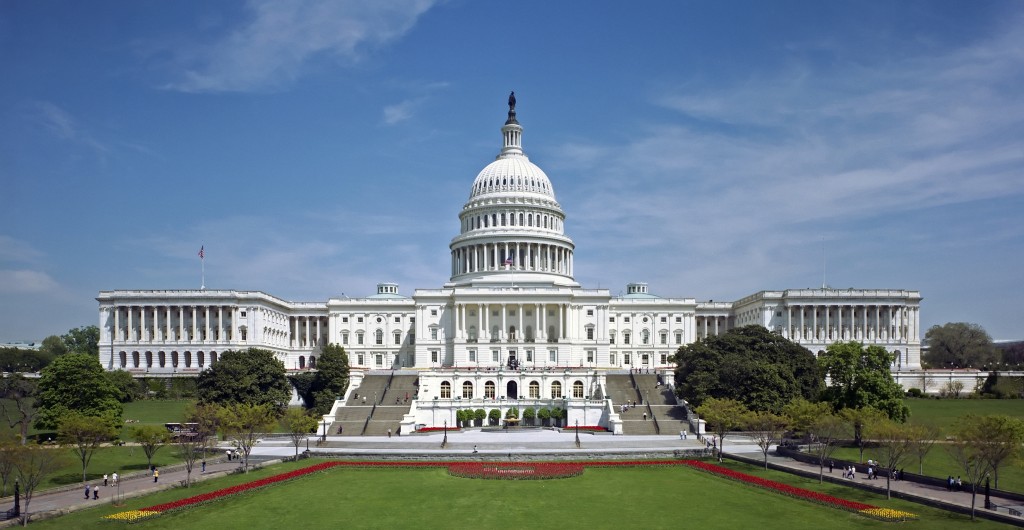This week in the U.S. House of Representatives, Senate: Mar. 14 – Mar. 18, 2016

It’s going to be a busy week on Capitol Hill as the U.S. House of Representatives returns from a week-long district work session, and the U.S. Senate endeavors tackle its workload in order to adjourn for spring recess by week’s end. On Monday, the House is in session and will consider several bills under Suspension of the Rules.A full list of bills can be found here. Most notably, two concurrent resolutions regarding atrocities in the middle east: H. Con. Res. 121, which condemns the Syrian government for war crimes against its civilian population. Alabama co-sponsor(s): None. H. Con. Res. 75, which expresses the sense of Congress that Islamic State atrocities against religious and ethnic minorities constitute war crimes, crimes against humanity, and genocide. Alabama co-sponsor(s): Rep. Bradley Byrne (AL-01); Rep. Mike Rogers (AL-03); Rep. Robert Aderholt (AL-04); Rep. Gary Palmer (AL-06) Additional items on the floor this week: H.R. 3797: the Satisfying Energy Needs and Saving the Environment Act (SENSE) Act. The bill establishes separate standards under which electricity-generating power plants that primarily use waste coal as a fuel source could comply with EPA’s Cross-State Air Pollution Rule and the Mercury and Air Toxics Standards (MATS) Rule, by blocking reductions in emissions allowances for sulfur dioxide for purposes of the cross-state rule and by setting an alternative standard for sulfur dioxide under the MATS rule. Alabama co-sponsor(s): None. H.R. 4596: the Small Business Broadband Deployment Act. The bipartisan bill exempts, for five years after enactment, small-business broadband Internet service providers that have 250,000 or fewer subscribers from the enhanced disclosure requirements of the Federal Communications Commission’s (FCC) 2015 net neutrality rule. Alabama co-sponsor(s): None. A resolution authorizing Amicus Curiae in United States v. Texas. The measure authorizes the House of Representatives to file a friend of the court brief (an amicus curiae) against the administration’s position in United States, et al. v. Texas, et al., the Supreme Court case involving the president’s executive actions on immigration. Background: In November 2014, the Obama administration announced executive actions on immigration intended to prevent nearly 5 million illegal immigrants from being deported, including illegal immigrants who have been in the country for more than five years and are parents of children who are U.S. citizens or lawful permanent residents. Texas led nearly two dozen states in suing the Obama administration over that initiative, and the case is expected to be argued before the Supreme Court in April. On Friday, the House is not in session. Highlights of what is happening in House Committees this week: Budget Season: Budget season continues with the House Armed Services Committee, House Homeland Security Committee, House Education and Workforce Committee, and House Foreign Affairs Committee all holding related hearings. The House Appropriations committee also continues its FY17 hearing slate, a full list of those hearings can be found here. Possible Budget Markup: Though not confirmed as of the time of this writing, it is possible the House Budget Committee could hold a markup of the House FY17 Budget Resolution this week. Concussions: On Monday, the House Energy and Commerce Committee will hold a panel discussion titled “Broad Review on Concussions: Initial Roundtable” focusing on the causes, effects and treatments of concussions and head trauma. More information here. Flint, MI Water Crisis (two hearings): On Tuesday, the House Oversight and Government Reform Committee will hold a hearing titled “Examining Federal Administration of the Safe Drinking Water Act in Flint, Michigan, Part 2.” (Part one of the hearing took place on February 3.). Tuesday’s hearing will feature the testimony of Susan Hedman, former EPA Region 5 administrator, Darnell Earley, former emergency manager of Flint, Dayne Walling, former mayor of Flint, and Marc Edwards, professor of environmental and water engineering at Virginia Tech. Then, on Thursday, the committee will hold a hearing titled “Examining Federal Administration of the Safe Drinking Water Act in Flint, Michigan, Part 3.” Thursday’s hearing will feature EPA Administrator Gina McCarthy and Michigan Governor Rick Snyder. More information about these hearings can be found here and here. E&C Markup: On Monday and Tuesday, the House Energy and Commerce Committee will hold a markup of H.R.2666, the No Rate Regulation of Broadband Internet Access Act and H.R.4725, the Common Sense Savings Act. More information here. Women and Terrorism: On Tuesday, the House Homeland Security Committee will hold a roundtable discussion titled “Women and Terrorism”. The panel features Rep. Martha McSally (R-AZ) and Rep. Kathleen Rice (D-NY). More information here. Resources Markup: On Tuesday, the House Natural Resources Committee will hold a markup of more than a dozen bills. More information here. Afghanistan: On Wednesday, the House Oversight and Government Reform Committee will hold a hearing titled “Rebuilding Afghanistan: Oversight of Defense Department Infrastructure Projects.” More information here. Veterans: On Wednesday, the House Veterans’ Affairs Committee and Senate Veterans’ Affairs Committee will continue their series of joint hearings on the legislative priorities of veterans service organizations. This hearing will be on the legislative priorities of the Fleet Reserve Association, the Retired Enlisted Association, the National Association of State Directors of Veterans Affairs, the Military Officers Association of America, the Air Force Sergeants Association, the American Ex-Prisoners of War Organization, the Non-Commissioned Officers Association, Jewish War Veterans of the United States of America, and the Iraq and Afghanistan Veterans of America. More information here. Foreign Affairs Markup: On Wednesday, the House Foreign Affairs Committee will markup H.R. 4678, the United States Naval Station Guantanamo Bay Preservation Act, which would prohibit modification, abrogation, abandonment, or other related actions with respect to United States jurisdiction and control over United States Naval Station, Guantanamo Bay, Cuba, without congressional action. More information here. SBA Oversight: On Wednesday, the House Small Business Committee will hold a hearing titled “Small Business Administration Management and Performance Challenges: The Inspector General’s Perspective.” More information here. USDA: On Thursday and Friday, the House Agriculture Committee will hold a hearing titled “Examining USDA organization and program administration.” More information here. Senate Schedule The Senate will resume legislative business on Monday. Up for consideration this week is the nomination of John King to be Education secretary.
Andrew A. Yerbey: Diplomas of duplicity

Two weeks ago, Tommy Bice announced his plans to step down as Alabama’s superintendent of education. Reflecting on his tenure, Bice singled out one accomplishment with especial pride: the nearly 90% graduation rate of public-school students in Alabama. This is not, however, an accomplishment that should be celebrated: it will go down as the most pernicious failure of the Bice superintendency. When the high-school diploma has been as devalued as it has, its benefits–economic and otherwise–become a false promise. By way of background, compare the presentation Bice delivered a few months back, emblazoned “Every Child a Graduate,” with a journal article published in 1954, entitled “A High School Diploma for All!” The similarities do not end with semantics. The journal article was penned by the principal of an Alabama school that had undertaken a new approach to graduating its students. The principal encapsulated the “experiment” thus: “It calls for awarding a . . . diploma to any student who has spent three years [grades ten through twelve] in high school. . . . Scholastic achievement is no longer the basis for awarding the diploma.” The mastery of “theoretical” material, such as mathematics and science, was not required for students to graduate. This policy was approved by the Alabama State Department of Education at the time–and has essentially been institutionalized by the Alabama State Department of Education of today. Evidence is provided by the meteoric rise in the graduation rate of public-school students in Alabama. The rate has skyrocketed seventeen points in four years, from 72% in 2011 to 89% in 2015. To put this percentage in perspective, if the graduation rates of the other forty-nine states were to remain unchanged from 2014, then Alabama’s graduation rate would now rank third nationally. The problem, of course, is that Alabama has seen nothing remotely similar occur with regard to scholastic achievement, which remains dismal–among the worst of the worst in the United States. Consider the results of the ACT. The ACT defines college readiness as “about a 75% chance of obtaining a C or higher in the corresponding credit-bearing college courses . . . based on the actual performance of students in college.” In an era of grade inflation, a grade of C in a first-year college course is not a very high benchmark. Yet, the percentage of Alabama students who graduated ready for college-level coursework in English, math, reading, and science was a mere 16% in 2015, down from a mere 18% in 2011; the national average was 28%. It is no wonder, then, that 32% of Alabama public-school graduates who attend college need remediation. Consider the results of the ACT Plan, an assessment (now the ACT Aspire) taken by tenth-graders that predicts success on the ACT. School-level data is available for the ACT Plan, and surveying it shocks the conscience. Assuming that the ACT Plan scores are representative of upperclassmen, more than two dozen high schools in Alabama–with a combined graduation rate of 83%–could have graduated a group of students without a single one of those graduates being college-ready. These schools might be the worst, but they are most certainly not outliers. Consider the results of the National Assessment of Education Progress (NAEP), known as “The Nation’s Report Card” and considered the standard for measuring scholastic achievement. According to the 2015 scores, only 17% and 26% of Alabama eighth-graders are, respectively, proficient in math and reading–with neither score changing significantly since 2011, and both scores remaining significantly below the national average. A recent report by the Urban Institute, which adjusted the 2013 scores to account for student demographics, thereby allowing more accurate state-to-state comparisons, brings it all back home. Ranking forty-eighth in the nation, ahead of only Hawaii and West Virginia, Alabama can “thank God for Mississippi” no longer. Did it not occur to the superintendent that our state having (1) among the worst scholastic achievement in the country and (2) among the highest graduation rate in the country was not a reason for celebration–that it was, in fact, the opposite? It should have, and once did: “We celebrated it–we put up billboards, we gave parties, we put out ice cream, we gave certificates. All we did was lie to our kids and their parents about how successful they were.” That was Bice, back in 2014. He was speaking not about the graduation rate, but about the exit exam, which he lambasted as useless “because . . . 31% of the [students who took the ACT in 2013, the last year of the exit exam] met the college-readiness benchmark in math.” Two years later, in 2015, the same measure was 23%–having plunged eight points, even as the graduation rate soared. “All we did was lie to our kids and their parents about how successful they were,” indeed. The next superintendent will have to rebuild the trust that has been lost in Alabama’s high-school diploma. This means ensuring that it reflects scholastic achievement. This does not mean undue emphasis on standardized tests or a return to the misguided policies of No Child Left Behind. But it will be helpful to glance backward as we go forward, to recall what those policies were meant to combat: “the soft bigotry of low expectations.” How better to describe the act of awarding diplomas without requiring scholastic achievement? • • • Andrew A. Yerbey is Senior Policy Counsel for the Alabama Policy Institute (API). API is an independent, nonpartisan, nonprofit research and educational organization dedicated to the preservation of free markets, limited government, and strong families.
Alabama gas prices among lowest in nation

According to the AAA Daily Fuel Gauge Report, the average price of gasoline in the United States is $1.935 per gallon. But Alabama residents are enjoying gas prices at about $1.728 per gallon for regular gasoline. Alabama’s prices on regular gas put it at fourth in the nation for cheap fuel prices, being bested by only Arizona, New Jersey, and South Carolina. The states with the highest gas prices are California ($2.593 per gallon) and Hawaii ($2.545 per gallon). At this time last year, Alabamians were paying about $2.18 a gallon for regular gas. Alabama fuel hit its highest point in September 2008, when travelers were seeing a price tag of $4.052 for a gallon of regular. Fuel prices recently hit their lowest point — at about $1.50 for regular in February — since March 2015. Currently, the price per gallon for midlevel is $1.970, premium is $2.226 and diesel is $1.955. Those prices put Alabama at seventh, 14th and 15th, respectively. Although those numbers are refreshing for those preparing to venture out for spring break, an upward trend is beginning to appear, according to a, AAA press release. Gas prices have seen their sharpest spike in more than a year, while prices have inched up 12 cents this week. The increase is because of a decline in “gasoline supplies, relatively strong demand and continued refinery maintenance.” “Prices typically move higher at this time of year as gasoline demand begins to increase and refineries conduct seasonal maintenance,” AAA Public Relations Director Michael Green said in the release. “This year’s refinery maintenance season is characterized by lower-than-expected prices for crude oil and ample supplies, which should help keep pump prices relatively low compared to recent years.” Despite that, Green noted that some parts of the country will likely continue to see rise in gas prices caused by “fluctuations in in local supply and demand associated with continued maintenance and preparations for summer-blend gasoline in advance of the June 1 deadline for retail facilities to sell the cleaner blend.”
Bradley Byrne: Why tourism matters

It is that time of the year again. Families and students are flocking down Interstate 65 or across Interstate 10 to our Alabama beaches for spring break. Those of us who have lived here our entire lives know what it means: crowded roads, packed restaurants, and full hotels. What you may not have realized, is just how important tourism is to our area’s economy. In Baldwin County alone, 5.7 million tourists visited the beaches last year. About 46,000 people in Baldwin County are employed in the tourism and hospitality industry. Even more, the economic impact in just Baldwin County is over $3.5 billion dollars, and the number of visitors to our beaches continues to grow each year. Tourism isn’t just limited to the beaches. Many people travel to Mobile for Mardi Gras or to visit the historic city. In fact, the USS Alabama saw over 400,000 visitors last year and is one of the top five most visited tourist attractions in Alabama. Mobile also continues to grow and expand their tourist appeal. Just last week, I toured the new GulfQuest maritime museum in downtown Mobile, a great asset to our city that will boost tourism. In Escambia County, there is the Wind Creek Casino and Hotel, which helps support the local community and serves as a stopping point for many groups visiting our beaches. Finally, each year thousands of people travel to Monroeville for the annual performances of “To Kill A Mockingbird.” As the people in Monroeville know, hotels and restaurants are packed during play season. All told, the lodging tax revenue for just Baldwin and Mobile counties in 2015 totaled over $62 million dollars. That is money that can be used to support our communities and improve the quality of life for local residents. In Congress, I have made it a top priority to do everything I can to support tourism. I am a member of the Travel and Tourism Caucus and a co-chair of the Coastal Communities Caucus. Here are two specific areas where Congress can act to support Alabama’s tourism economy. First, Alabama’s visitors are primarily vehicle travelers, so it is critical we have a safe and reliable Interstate and highway system to help transport people to our destinations. For example, a new I-10 bridge over the Mobile River would go a long way toward boosting tourism, especially when it comes to people traveling from one of our neighboring states like Florida, Mississippi, or Louisiana. The bridge will also be an important hurricane evacuation route for moving people off our beaches in the unfortunate event of severe weather. Last year, Congress passed a long-term highway bill to make it easier to fund important highway projects. Now we need to cut through some of the bureaucratic delays and speed up these important projects. Second, we need to pass important reforms to get a longer Red Snapper season. Many visitors to our coastal communities want to go fishing, and a longer Red Snapper season would mean increased tourism. I was able to help get a bill through the House last year with three important reforms that would lead to a longer Snapper season. Now we just need to get that bill passed through the Senate and signed into law. Those are just two straightforward ways Congress can help support tourism, and in turn the economy, right here in Southwest Alabama. Ultimately, our area’s greatest asset will always be our people and our outstanding southern hospitality. I have no doubt visitors will continue flocking to Southwest Alabama for decades to come. • • • Bradley Byrne is a member of U.S. Congress representing Alabama’s 1st Congressional District.
Presidential Primary Brief: 238 days until Election Day

238 days until Election Day Convention Dates: Republican July 18-21, 2016, Democratic July 25-28, 2016 Weekly Headlines: Ben Carson endorses Donald Trump Kasich ahead in Ohio, Trump up big in Florida Obama warns against campaign anger Press Clips: In Ohio, Clinton opposes Obama auto parts trade standard (Lincoln Star Journal 3/12/16) Hillary Clinton wants stricter rules on auto imports than the Obama administration negotiated in a sweeping Pacific trade deal that’s a major priority for the White House. Under the Trans-Pacific Partnership, automobiles could be imported tax-free into the U.S. even if most parts in those vehicles were made in countries that are not in the trade alliance. That’s drawn opposition from auto-state senators, such as Ohio Democrat Sherrod Brown, who say it would encourage manufacturers to use cheaper parts from China, which is not part of the agreement. Breaking down the GOP map (Politico 3/13/16) Welcome to what might be the most decisive day of the 2016 GOP campaign. Depending on Tuesday’s results, one or more of the remaining candidates might be forced to drop out. And Donald Trump might be unstoppable. If Trump rolls to victories in Florida and Ohio – the first states on the calendar this year that award every last delegate to the statewide winner – his lead becomes all but insurmountable. Without home-state wins, Marco Rubio and John Kasich would have little cause to continue on. Five things to know about the Florida Primary (USA Today 3/11/16) The presidential primaries were supposed to be settled by now. By mid-March, it was assumed, Jeb Bush would be well on his way to clinching the Republican nomination and Hillary Clinton would have rolled over independent Sen. Bernie Sanders on her way to the Democratic general-election ballot. Florida voters weren’t expected to have much of a say. But Donald Trump’s sustained surge confounded expectations among Republicans, and Sanders stunned the Clinton campaign with primary and caucus victories in nine states. Candidates weaponize free trade issue (Politico 3/12/16) Hillary Clinton hardened her stance against the Trans-Pacific Partnership agreement Saturday in a last-ditch effort to prevent Democratic rival Bernie Sanders from riding a wave of populist anger to another victory Tuesday in a key industrial state. Her comments at a Youngstown, Ohio rally ratcheted up her criticism of a deal she once backed as secretary of state and are the latest assault on the pact by candidates of both parties seeking to harness voter backlash against free trade. Secret Service swarm Trump at Ohio rally (Politico 3/12/16) Donald Trump was swarmed by four secret service agents on stage during a rally in Vandalia, Ohio, on Saturday morning after an apparent security breach. The Republican frontrunner looked momentarily panicked and moved quickly away from the lectern as four agents rushed him and created a circle around him. The breach was reportedly from an unidentified man who tried to get through the security barrier. “I was ready for him, but it’s much easier if the cops do it, don’t we agree?” Trump later told the crowd. The rest of the rally proceeded without incident. Sanders aides dispute Clinton claim that senator was absent in ’90s health care Rights (CNN 3/12/16) Hillary Clinton on Saturday questioned where Vermont Sen. Bernie Sanders was when she was fighting for expanding health care as first lady in 1993 and 1994. “We are going to pull together and stay together and stand up against those powerful forces. And I always get a little chuckle when I hear my opponent talking about doing it,” Clinton said at an event here. “Well, I don’t know where he was when I was trying to get health care in ’93 and ’94, standing up the insurance companies, standing up against the drug companies.” The problem: Sanders attended an event with her to push health care reform in 1993 and introduced his own single-payer health care plan in March of that year. And Clinton wrote him a hand-written thank-you note for his work on the issue in 1993. Trump Chicago rally postponed amid scenes of chaos (Politico 3/11/16) Raucous protests shut down a planned Donald Trump rally Friday night before the Republican presidential front runner even appeared, sparking scenes of chaos inside and outside the arena that the candidate said infringed his right to freedom of speech. More than 30 minutes after the event was supposed to start, a representative stepped to the lectern to announce that the event was being canceled for safety considerations. That set off an eruption of cheers and screams from hundreds of people who revealed themselves to be protesters: “We stopped Trump! We stopped Trump!” they said, jumping, shouting and tearing up Trump signs. Conservatives Face an Impossible Choice (The Atlantic 3/12/16) The accelerating likelihood that Donald Trump will win the Republican presidential nomination outright thrusts an agonizing dilemma on Republican politicians. Leave aside their own personal feelings about Trump. The most likely consequence of a Trump nomination is a severe Republican defeat in November, and not a defeat for Trump alone. Some significant number of Republicans just won’t vote for Trump. When people don’t want to vote for the top of a ticket, they often stay home altogether, dooming every close race lower down on the ticket. Republicans have Senate seats at risk in Florida, Illinois, New Hampshire, Ohio, Pennsylvania, and Wisconsin—sufficient to put the Republican majority in question.
Luther Strange praises U.S. Senate for passage of CARA, bill to combat opioid epidemic

Last week, the U.S. Senate passed the Comprehensive Addiction and Recovery Act (CARA), a bill aimed at providing states with the necessary tools to combat the scourge of heroin and opioid abuse that has plagued the nation recently. The legislation passed with only one vote in opposition, and a companion bill is set to go before the U.S. House of Representatives soon. Alabama Attorney General Luther Strange was quick to praise the Senate’s action. “While stronger enforcement is needed to reduce the disastrous impact of illegal drugs upon our society, we must also address the reality of addiction including the availability of effective treatment,” Strange said in a news release. “The Comprehensive Addiction and Recovery Act provides a nationwide plan to tackle drug addiction with the goal of saving lives. We are grateful to the Senate for its passage of this legislation and urge the U.S. House to give CARA swift approval.” Strange and 37 Attorneys General from across the country penned a letter in September 2015 urging lawmakers to pass the legislation. Further, the Attorney General’s 2015 Law Enforcement Summit, which was attended by more than 700 officers from across the state, focused on ways to fight the drug epidemic through education and enforcement techniques. CARA includes provisions to tackle the following: Expand prevention and educational efforts – particularly aimed at teens, parents and other caretakers, and aging populations – to prevent the abuse of opioids and heroin, and to promote treatment and recovery; Expand the availability of naloxone to law enforcement agencies and other first responders to help in the reversal of overdoses to save lives; Expand resources to identify and treat incarcerated individuals suffering from addiction disorders promptly by collaborating with criminal justice workers and by providing evidence-based treatment; Expand disposal sites for unwanted prescription medications to keep them out of the hands of children and adolescents; Launch an evidence-based opioids and heroin treatment and intervention program to assist in treatment and recovery throughout the country; and Strengthen prescription drug-monitoring programs to help states monitor and track prescription drug diversion and to help at-risk individuals access services.
“Stunning contradiction” in many states’ records laws: Legislatures frequently exempt themselves

State capitols are often referred to as “the people’s house,” but legislatures frequently put up no-trespassing signs by exempting themselves from public-records laws. That tendency was apparent when The Associated Press sought emails and daily schedules of legislative leaders in all 50 states. The request was met with more denials than approvals. Some lawmakers claimed “legislative immunity” from the public-records laws that apply to most state and local officials. Others said secrecy was essential to the deliberative process of making laws. And some feared that releasing the records could invade the privacy of citizens, creating a “chilling effect” on the right of people to petition their government. Without access to such records, it’s harder for the public to know who is trying to influence their lawmakers on important policy decisions. “The public has a right to know what their elected officials are doing, because it’s the people’s job to hold those folks politically accountable,” said Peter Scheer, executive director of the First Amendment Coalition, a San Rafael, California-based nonprofit that advocates for greater openness in government. All legislatures allow people to watch and listen to their debates. But an AP review of open-government policies found that many state legislatures allow closed-door caucus meetings in which a majority of lawmakers discuss policy positions before public debates. Others have restrictions on taking photos and videos of legislative proceedings. In some places, lawmakers have no obligation to disclose personal financial information that could reveal conflicts of interest. Legislators possess the power to change that but are sometimes reluctant to act. A bill advancing this year in Massachusetts, for example, would strengthen the state’s public-records laws by limiting fees and setting new deadlines for state agencies and municipalities to comply. Yet it would continue to exempt lawmakers. That mirrors the way things work in Washington, D.C. Congress exempted itself when it passed the national Freedom of Information Act 50 years ago. The president and his immediate staff also are exempt. By contrast, many governors are subject to state sunshine laws. In many states, the public-records requirements passed by lawmakers present “a stunning contradiction,” said Charles Davis, dean of the College of Journalism and Mass Communication at the University of Georgia and a former executive director of the National Freedom of Information Coalition. “I have just always found it astonishing that they would put those requirements on public officials throughout government and exempt themselves at the same time,” he said. To gauge compliance with public-records laws, the AP sent requests to the top Democratic and Republican lawmakers in all states and most governors seeking copies of their daily schedules and emails from their government accounts for the week of Feb. 1 to Feb. 7. Of the more than 170 lawmakers who responded by mid-March, a majority denied the requests by claiming they were legally exempt. The governors were slower to respond but more often provided the information. The legislative denials came from lawmakers of both parties, although slightly more from Republicans. In states where some lawmakers said “yes” and others “no,” it was more often the majority party lawmakers who denied the requests while a minority party leader complied. In Missouri, Senate President Pro Tem Ron Richard was asked in front of dozens of reporters and editors whether he would release his government emails and daily calendars. “All you have to do is ask for it, and I’ll give it to you. I don’t care,” Richard told those attending a statewide press association event in February. Yet when the AP subsequently submitted an open-records request, Richard reversed course. A Senate administrator responded on his behalf with a letter saying that individual lawmakers aren’t subject to the Missouri Sunshine Law. Richard, who is in his first year as the Senate’s top lawmaker, explained that he learned his predecessors had determined they were exempt, and he didn’t want to break with precedent. “I’m telling you I don’t hide anything in my emails. I just don’t do that,” said Richard, a Republican from Joplin. Mississippi House Speaker Philip Gunn responded with a denial letter asserting his emails and calendars were his personal property, not subject to the Mississippi Public Records Act and protected “under the doctrine of legislative immunity” dating back hundreds of years to English common law. Denial letters on behalf of Illinois’ top Democratic and Republican lawmakers said, among other things, that releasing the records could amount to a “clearly unwarranted invasion of personal privacy” for individuals who contacted lawmakers without expecting their names to appear in the news media. An attorney for Kentucky’s legislature said secrecy was needed “to encourage effective and frank communications.” “Arranging honors for our fallen heroes, seeking options for Kentuckians with substance abuse problems or counseling citizens regarding confidential problems are all in a day’s work for our members,” wrote Kentucky legislative general counsel Morgain Sprague. “These communications have always been protected by law.” If lawmakers followed the same open-records rules that apply to others in government, the potential for some sensitive content being revealed would not be a reason for denying access to all of their emails. Rather, they could redact or withhold particular emails covered by various sunshine law exceptions while releasing the rest. In several states, lawmakers who provided their records did withhold certain emails that they considered to be exempt from disclosure. Texas Lt. Gov. Dan Patrick, who is the Republican head of the Senate, released 48 pages of emails but withheld the rest pending a request for a state attorney general’s opinion on whether confidential communications between elected officials and citizens are shielded from disclosure. New Mexico lawmakers released hundreds of emails, mainly from constituents, but withheld three under an exemption for correspondence with certain legislative staff. They also released copies of their daily calendars showing breakfasts and dinners sponsored by industry and interest groups. Lawmakers in Florida, which has one of the more expansive sunshine laws, freely released emails from people urging them to support or oppose particular bills. They also released calendars showing
Alabama unemployment ticks up in January

On Monday, Gov. Robert Bentley announced that Alabama’s January unemployment rate came in at 6.2 percent, a slight increase over the 6 percent in December. The Civilian Labor Force (CLF) increased by more than 8,000, bringing the state’s CLF total to 2,154,061. Similarly, the number of employed Alabamians increased by about the same margins, bringing the total of people employed to its highest number since October 2008. Wage and salary employment came in at 1,930,300, the highest number since January 2008. Overall, such employment has increased by more than 18,000, with significant increases seen in the education and health services sector (more than 5,700); the trade, transportation and utilities sector (more than 5,400); and the professional and business services sector (more than 4,600). The counties with the lowest unemployment rates include Shelby at 4.5 percent, Elmore and Lee at 5.3 percent, and Autauga and St. Clair at 5.4 percent. However, a number of Alabama counties are still seeing unemployment rates over 10 percent, including Clarke (12.4 percent), Greene (10.8 percent), Lowndes (12 percent), Monroe (10.3), Perry (10.1 percent), and Wilcox (16 percent). Of Alabama’s 67 counties, only 20 are below the state’s unemployment rate. Of the remaining 47 counties, 42 have unemployment rates higher than the state average. “January’s rate contains some interesting and positive data,” Alabama Department of Labor Commissioner Fitzgerald Washington said in a news release. “There is almost no change in the rate, mainly due to the fact that there were more people in the labor force and more people were employed. These are both good signs, because it means that people are continuing to display confidence in the economy and that they are able to find work. In fact, the number of people counted as employed in January is higher than it has been since October 2008.” “We remain committed to lowering Alabama’s unemployment rate, but we are even more committed to making sure that every Alabamian who wants a job has the opportunity to have one,” Bentley said in the release. “We are making significant progress towards that goal. This month’s jobs numbers are showing some of the best growth we have seen in years, and we are encouraged by the momentum. We will not stop in our mission to bring quality jobs to Alabama, and help our existing businesses become even more successful.”
Alabama legislative preview: Mar. 14 – Mar. 18, 2016

The Legislative Session resumes Tuesday when the Alabama House of Representatives reconvenes at 1 p.m and the Senate an hour later. The Senate is slated to take up a slew of measures this week, including SB89 from Sen. Arthur Orr (R-Decatur) which would require all Alabama public school students to pass a civics test to graduate. SB148 from Sen. Jim McClendon (R-Springville), which would require all passengers in a vehicle to wear a safety belt, will also come up this week. The measure met with opposition when last it appeared on the floor, as lawmakers questioned the need for furthering meddling in people’s private matters. The “Fantasy Contests Act,” SB114 from Sen. Paul Sanford (R-Huntsville), will also come up for discussion this week, as well as SB14 from Sen. Gerald Allen (R-Tuscaloosa), which would authorize carrying weapons in vehicles without a permit. Over in the House, lawmakers will take up their version of the “Fantasy Contests Act,” as well as the lottery bill from Rep. Alan Harper (R-Northport). HB13 would allow people to vote on whether or not a lottery is allowed in the state, though it provides no details on how profits from such a lottery would be allocated. The body will also take up three bills from Rep. Mike Jones (R-Andalusia): HB332 which would abolish common law marriages; HB333, which would change laws related to judge’s ruling in divorce cases; and HB334, which would provide a process for grandparents to petition for visitation rights with their grandchildren. A slew of alcohol-related legislation is also scheduled to go before the House. The House was scheduled to take on the General Fund budget this week, but the activity calendar makes no mention of the legislation coming before the body. The Senate Committee on Agriculture, Conservation and Forestry is set to take up a bill that would legalize industrial hemp in the state on Wednesday and the Senate Judiciary Committee is slated to take up SB97 from Sen. Gerald Dial (R-Lineville), which would allow the Ten Commandments to be displayed on state and public school property. The Alabama Prison Transformation Initiative Act will once again appear before the Senate Committee on General Fund Finance and Taxation, where a vote is scheduled to take place. The House Committee on Public Safety and Homeland Security will take up HB98 from Rep. David Standridge (R-Hayden), which would provide a lifetime pistol permit to retired military veterans and the House Committee on Health will debate HB159 from Rep. Arnold Mooney (R-Birmingham), which would allow doctors to decline services that violates their conscience. The House Judiciary Committee will take up two marijuana-related bills: HB61, also known as “Leni’s Law,” from Rep. Mike Ball (R-Madison), which would decriminalize possession of the seizure-reducing medication cannabidiol, and HB257 from Rep. Patricia Todd (R-Birmingham), which would make possession of 1 ounce or less of marijuana punishable by only a fine.

